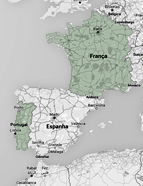

Despite this oppositionist vein in the trajectories of most of the names associated with the SPHC, the available documentation reveals extreme caution in dissociating the political activity of its members from the institution's aims. In a letter sent by Fernando Pinto Loureiro in November 1947 to Borges de Macedo, secretary of the SPHC, he suggests replacing the word "civic" in the draft statutes with "scientific", since the inclusion of the former "could serve as a weapon for the future prohibition of the 'Society's' work, on the apparently legal grounds of the lack of civic suitability of some of its members".
Manuel Heleno, the only representative of Portuguese university institutions, also joined the SPHC. A full professor at the Faculdade de Letras da Universidade de Lisboa, his entry into the SPHC stemmed from his good relations at the time with Magalhães Godinho - who had invited him to teach at this faculty and claimed to have been the only member of the School Council who had voted in favour of his continuation in 1944 (Godinho, A expansão quatrocentista... [15th-century expansion], 2008, p. 10). On the other hand, Manuel Heleno's inclusion was intended to provide a guarantee to the authorities of the project's scientific integrity. It was no coincidence that he had been granted the honorary position of president of the SPHC's general assembly. With the troubled departures of Magalhães Godinho and António José Saraiva from the FLUL a few years earlier, and the public knowledge of several founding members' oppositional activity, at least at a cultural level, a strategic goal was behind the presence of a full professor, given the need to legalize the SPHC.
The contacts established with the aforementioned Brazilian researchers can also be interpreted in the same light, however without underestimating the recognition of their scientific skills and suitability for the purposes of the SPHC. Thus, it should be noted that both Pedro Calmon and Gilberto Freire were then members of the Portuguese History Academy, an institution created by the Estado Novo in 1936. In the case of Gilberto Freire, his intellectual prestige went far beyond Brazilian and Portuguese borders. Indeed, the laudatory preface written by Lucien Febvre to the first French edition of Casa-grande e Senzala in 1952 attests to the relevance of his affiliation with the SPHC. Only in the 1950s and 1960s, after the SPHC's invitation, did Gilberto Freire's work come to be politically and ideologically orchestrated by the Estado Novo in the context of the emerging decolonization of the African and Asian continents. It was used to highlight specific features of the Portuguese overseas presence throughout history in order to legitimize the continuity of the colonial situation.
